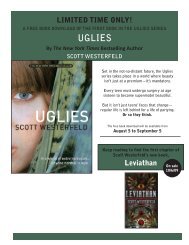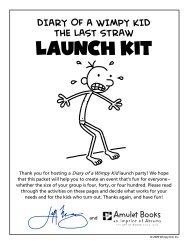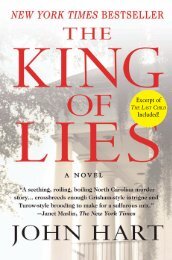a glossary for the uglies series - Borders
a glossary for the uglies series - Borders
a glossary for the uglies series - Borders
You also want an ePaper? Increase the reach of your titles
YUMPU automatically turns print PDFs into web optimized ePapers that Google loves.
A GLOSSARY FOR THE<br />
UGLIES SERIES<br />
A special look inside <strong>the</strong><br />
New York Times bestselling <strong>series</strong><br />
by SCOTT WESTERFELD<br />
The world of <strong>the</strong> Uglies <strong>series</strong> is different from ours, so it’s full of<br />
unfamiliar words. But if you haven’t read <strong>the</strong> books yet, put this<br />
<strong>glossary</strong> down! It’s better to learn <strong>the</strong> language by picking it up<br />
along <strong>the</strong> way. Read <strong>the</strong> books first.<br />
So why have a <strong>glossary</strong> at all? Well, I’ve gotten a lot of questions<br />
from readers about where <strong>the</strong> words come from and exactly what<br />
<strong>the</strong>y mean. Here are some answers.<br />
Read Bogus to Bubbly <strong>for</strong> more!
Littlie, ugly, pretty, and crumbly mean roughly<br />
<strong>the</strong> same as “child,” “teenager,” “adult,” and<br />
“elderly person.” Of course, <strong>uglies</strong> get <strong>the</strong><br />
operation and become pretty when <strong>the</strong>y turn<br />
sixteen, which is a little earlier than adulthood<br />
in our world. That’s why at first <strong>the</strong>y’re called<br />
new pretties, and aren’t expected to take things<br />
very seriously yet.<br />
Trivia: “Littlie” is Australian slang <strong>for</strong><br />
a little kid, and “crumbly” is British slang <strong>for</strong> an<br />
older person. In <strong>the</strong> Italian translation, pretties<br />
were called perfetti, which literally means<br />
“perfects.”<br />
Uglyville, New Pretty Town, Crumblyville are<br />
all parts of <strong>the</strong> city. Once you see those names,<br />
you realize how divided <strong>the</strong> city is. People of<br />
different ages live in different parts of town, and<br />
rarely interact. (Littlies live with <strong>the</strong>ir<br />
crumblies, of course.)<br />
Bubbly and bogus drive some readers crazy.<br />
Why do <strong>the</strong>se two words get used so much in<br />
Pretties? Well, bubbly means a lot of things to<br />
pretties: <strong>the</strong> champagne <strong>the</strong>y drink, <strong>the</strong> way<br />
<strong>the</strong>y act at parties, and how <strong>the</strong>y feel when <strong>the</strong>y<br />
like someone. Anything good, basically; and<br />
bogus means anything bad. It’s a lazy way to<br />
talk, but <strong>the</strong> pretties are lazy-brains, so I<br />
thought it made sense <strong>for</strong> <strong>the</strong>ir world to fall<br />
into two simple categories. Of course, when<br />
Tally and Zane start to be cured, <strong>the</strong>y start<br />
using “bubbly” as <strong>the</strong>ir secret code <strong>for</strong><br />
“thinking clearly.”<br />
Trivia: “bubbly” and “bogus” are used<br />
as slang in Evelyn Waugh’s Vile Bodies, about a<br />
rich, partying social group in <strong>the</strong> 1920s. The<br />
“pretty young things” in Waugh’s novel also use<br />
“shaming” and “nervous-making,” so I stole<br />
those, too.<br />
Specials and wardens are <strong>the</strong> city’s two kinds of<br />
en<strong>for</strong>cers. Wardens deal with simple issues like<br />
trespassing and truancy. But Specials are<br />
members of Special Circumstances, <strong>the</strong> secret<br />
branch of <strong>the</strong> city government that has<br />
replaced <strong>the</strong> military and intelligence services.<br />
They have <strong>the</strong>ir own kind of surgery, that<br />
makes <strong>the</strong>m cruel pretties, beautiful but scary.<br />
Trivia: In his utopian Culture <strong>series</strong>,<br />
Scottish novelist Iain Banks uses <strong>the</strong><br />
term “Special Circumstances” <strong>for</strong> <strong>the</strong><br />
government’s secret en<strong>for</strong>cers. So I<br />
stole it.<br />
Icy is what <strong>the</strong> Cutters say instead of “bubbly.”<br />
Specials are much scarier than pretties, so I<br />
wanted <strong>the</strong>m to use a word that sounded cold<br />
and sharp instead of frothy and fun. “Icy” was<br />
<strong>the</strong> logical choice.<br />
Tricks are very important in <strong>the</strong> world of<br />
Uglies. The city is very tightly controlled, so<br />
any time <strong>uglies</strong> can trick <strong>the</strong> authorities, <strong>the</strong>y<br />
score a small victory. That’s why I use<br />
“tricking” in <strong>the</strong> way we use “hacking”—not<br />
fooling just one person, but undermining a<br />
whole system.<br />
The Smoke is where <strong>the</strong> rebel Smokies live, and<br />
it’s called that because in <strong>the</strong> future, only<br />
runaways who’ve rejected <strong>the</strong> cities would burn<br />
wood <strong>for</strong> heat.<br />
Trivia: In <strong>the</strong> early industrial age, London was<br />
nicknamed “The Smoke,” because its factory<br />
smokestacks filled <strong>the</strong> sky with gray clouds. Are<br />
<strong>the</strong> Smokies headed back to that benighted<br />
era?<br />
Rusties are <strong>the</strong> oil-dependent culture<br />
that destroyed itself three hundred years be<strong>for</strong>e<br />
<strong>the</strong> books take place. They are, of course, us.<br />
Everyone calls <strong>the</strong>m Rusties because that’s all<br />
that’s left of <strong>the</strong>m: rust-covered ruins.<br />
Trivia: Some readers get confused and wonder<br />
if <strong>the</strong> Rusties all died, how did <strong>the</strong> cities<br />
appear? Well, when Rusty culture collapsed, a<br />
few million people survived. They still<br />
possessed our technology, but made a<br />
conscious decision to let <strong>the</strong> earth recover from<br />
<strong>the</strong> industrial age. That’s why <strong>the</strong> cities are so<br />
cautious and controlled: They are <strong>the</strong><br />
descendents of a fewtraumatized survivors.<br />
SpagBol is Australian slang <strong>for</strong> spaghetti<br />
bolognaise. Australians avoid saying long words<br />
if <strong>the</strong>y can help it.<br />
Trivia: Back when she was a littlie, my<br />
sister-in-law ate almost nothing but spaghetti<br />
bolognaise <strong>for</strong> six years. I thought that was<br />
funny, so I had Tally undergo a similar<br />
experience: SpagBol, SpagBol, SpagBol . . .<br />
Pings are messages carried by <strong>the</strong> city interface,<br />
<strong>the</strong> ever-present system of communication and<br />
control. Pings carry any kind of data you want,<br />
like a cross between E-mail, voicemail, and textmessaging.<br />
Trivia: I stole this from corporate slang <strong>for</strong> an<br />
E-mail that reminds you to do something, as in,<br />
“She didn’t send me that budget on time, so I<br />
pinged her about it.”<br />
Hoverboards are an old science fiction idea: a<br />
magnetically levitating surface halfway in size<br />
between a surfboard and a skateboard. I figured<br />
that boarders would wear magnetic crash<br />
bracelets, so if <strong>the</strong>y fell off <strong>the</strong>y wouldn’t splat.<br />
And once you had that technology around,<br />
you’d probably make some bungee jackets, a<br />
way to jump from burning buildings . . . or just<br />
to have fun.<br />
Trivia: All of my books have some kind of<br />
flying, climbing, or falling in <strong>the</strong>m.<br />
I have flying dreams, and in college<br />
I used to climb buildings. But don’t try <strong>the</strong>se<br />
things at home (or at college).<br />
Extras are all <strong>the</strong> people in Aya's city who aren't<br />
famous. They're stuck in <strong>the</strong> background, with<br />
no one watching.<br />
Simon Pulse<br />
www.FeelingBubbly.com<br />
www.ScottWesterfeld.com<br />
Eyescreens are devices put into people's eyes,<br />
so that <strong>the</strong>y can watch <strong>the</strong> feeds and get info<br />
from <strong>the</strong> city interface at all times. Feeds and<br />
fame are so important in Aya's city that people<br />
never want to stop watching.<br />
Face rank is what people in Aya's city call fame.<br />
Every time someone talks about you, watches<br />
you on TV, checks out your website, or even<br />
hums a tune you wrote, your face rank gets<br />
bumped. It's <strong>the</strong> ultimate maker of status and<br />
wealth.<br />
Kickers are like bloggers or journalists today;<br />
<strong>the</strong>y "kick" stories about cool and interesting<br />
stuff. Basically, kickers become famous by<br />
ga<strong>the</strong>ring all <strong>the</strong> amazing news happening<br />
during <strong>the</strong> mind rain.<br />
Manga-heads surge to make <strong>the</strong>mselves look<br />
like manga characters: huge eyes, high<br />
cheekbones, and wild hair.<br />
Merits are given to teachers, doctors, and o<strong>the</strong>r<br />
workers in Aya's city who aren't famous. It may<br />
not be as glamorous as face rank, but this half of<br />
<strong>the</strong> system is what keeps things running.<br />
Mind-rain is <strong>the</strong> explosion of creativity and<br />
invention caused when <strong>the</strong> cure turned<br />
everyone from bubbleheads into normalbrained<br />
people. It's a great time to be alive, if a<br />
little confusing.<br />
Trivia: I liked "mind-rain" because is also<br />
sounds like "mind-drain." So you're not quite<br />
sure if it's good or not.<br />
Surge-monkeys are people who use cosmetic<br />
surgery in crazy ways. We first see <strong>the</strong>m in<br />
Diego in Specials, but by <strong>the</strong> time Extras is<br />
happening, <strong>the</strong>y're much more freaky. Videoscreen<br />
skin? Fea<strong>the</strong>rs? How about a tiny snake<br />
<strong>for</strong> your little finger?











